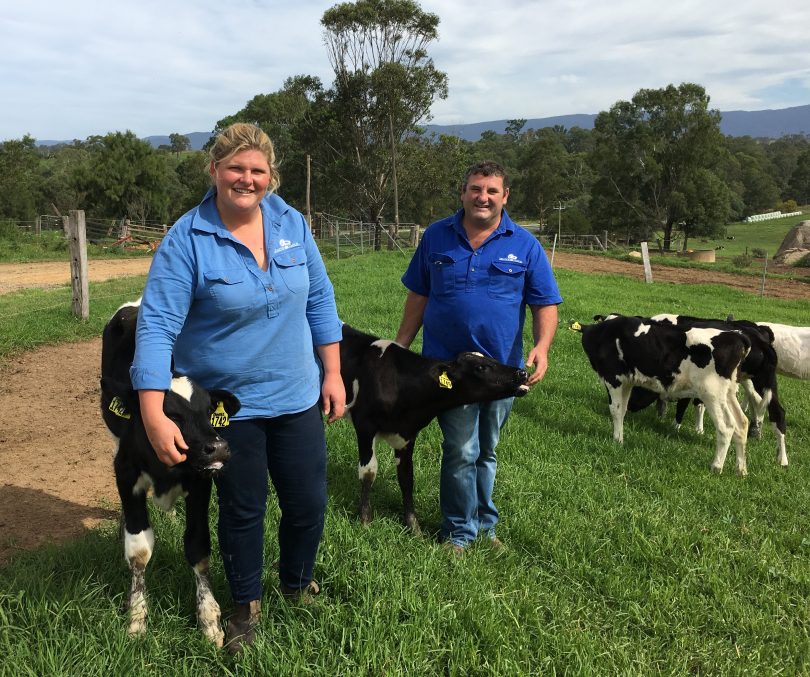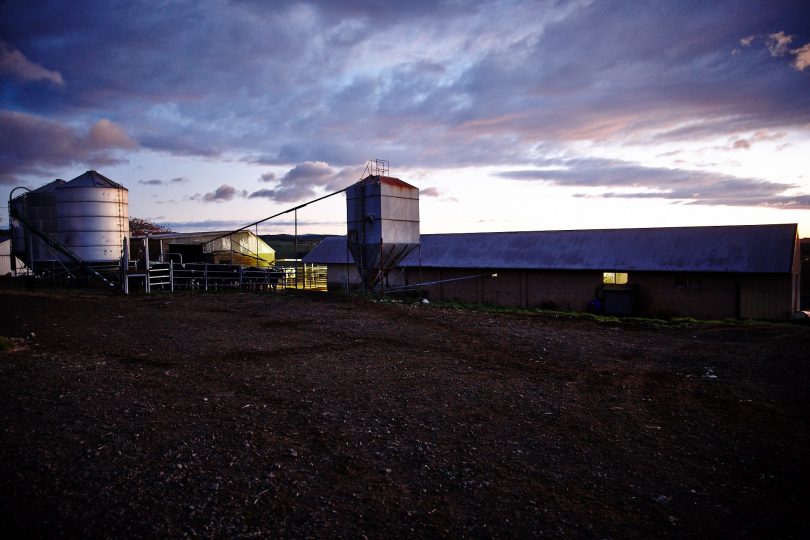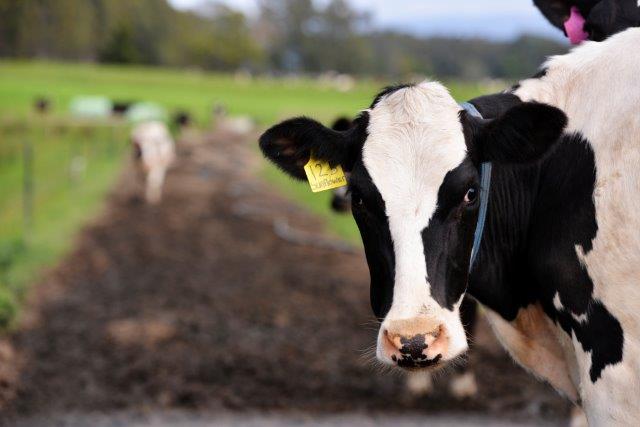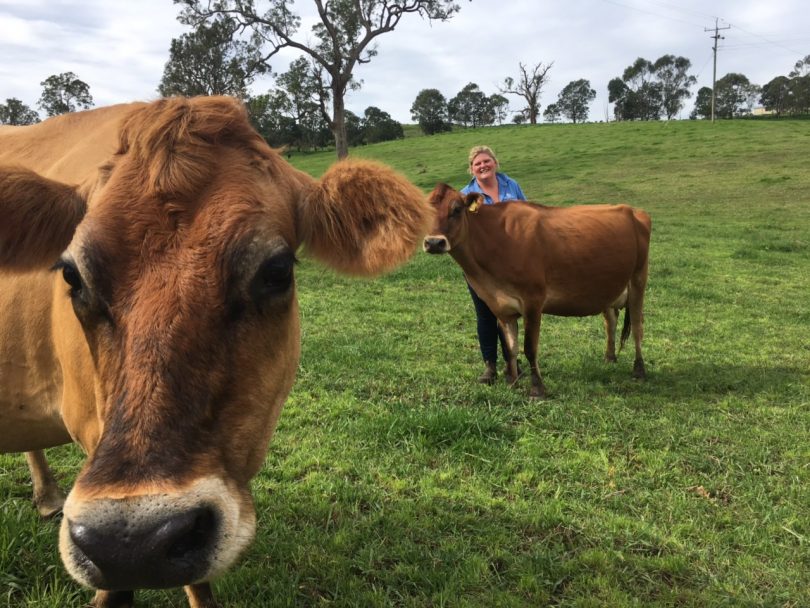
Ashleigh and Michael Rood with poddy calves on their dairy farm. Ash is one of the key speakers at the dairy symposium and will also speak on a panel of local farmers. Photo: Supplied.
When Bega Valley dairy farmer Ashleigh Rood answers her phone, it’s fitting that she says quickly “can I ring you back? I’ve got heifers on the road.”
I’m talking to Ash ahead of the biggest dairy event in New South Wales, the annual Dairy Research Foundation’s Symposium, which will be held this year in Bega for the first time. Ash is also Chair of the Far South Coast Dairy Development Group.
She’s looking forward to the event, despite having to juggle the day to day and surprises farming can throw at you.
The event aims to put science into practice and features a line-up of emerging scientists, with a focus in 2019 on helping farmers create a self-sufficient, homegrown feedbase.
But more than that, for Ash it’s an opportunity to come together, learn from each other and build a strong future together.
Feed accounts for over 50% of the cost in any production system and an efficient home-grown feedbase can have a massive impact on the bottom line of individual farms.
While the symposium’s focus is on helping farmer’s get ahead by lowering costs, what Ash reinforces and makes local is the fact that dairy farmers are struggling to get a fair price for their product, despite consumer demand being high.
“Our industry is very efficient and we’ve always used the technology available to make it more efficient,” Ash comments “but the elephant in the room is definitely price. We’re just not being paid what we need to be paid.”

Long hours and low return make dairy farming an industry that is not for the faint-hearted. Photo: Legenddairy.
Bega Valley dairy farmer Todd Whyman, also a key speaker at the event, will host the symposium’s farm day on Thursday at his family’s farm – ‘Cedar Grove’. Todd is actively working towards lowering costs by using natural soil improvement techniques and buying less artificial fertilizer – and feed.
“Buying in feed is becoming less sustainable,” he explains “about 60% of our stock diet is fed and with prices being what they are, most farmers are cutting back by 20-30% and thinking about growing a bit more corn. We want to be able to keep feeding the girls a bit of grain as well as grazing them.”
Todd runs the family business along with his parents’ in-law Ken and Judy Kimber and says that the family has been focusing on soil health for the past five years, using organic material produced on the farm to increase the amount of pasture they can grow.

Feeding more animals from the farm to reduce outputs is a priority for dairy farmers. Photo: Department Of Primary Industries Facebook.
A trial plot on the farm showed that land treated with compost and effluent performed as well as or better than land fertilised with traditional methods.
“Five weeks into the trial, there is an extreme difference – the compost and effluent plots have at least 60 per cent more pasture cover,” Todd says “as we all know dairying is getting harder as costs continue to rise and whatever we can do to keep those costs down is important.”
Todd says that while most manufacturers have bumped their milk prices up for next season, it’s not enough to reassure farmers who are struggling with drought conditions and high feed prices.
“If we want to keep dairy farming local, we’ve got to do more for our primary producers. Last year, there were 20 dairy farms in Tasmania sold to Chinese buyers,” Todd says.

Ash with a few of her herd. When she and husband moved back to the Bega Valley six years ago, she says she had to “learn to milk a cow bloody quickly!” Photo: Supplied.
Ash adds “last week was a hard week for the valley, with two well-known dairy farms announcing their intentions to exit the industry.”
A Bega Valley without dairy farms? It’s hard and ugly to imagine, those who wake early every day to milk and continue that heritage are working to build the industry far and near this week. How the rest of us can play our part must follow.
For those seeking a broader view of the industry, international guest speakers at the symposium include Dr David Chapman from Dairy NZ and Dr Edwin Kreykes, a veterinarian consultant from Iowa, USA.
Dr Chapman and Dr Krekes are joined by a range of Australian speakers including Bega Valley farmers Brodie and Kevin Game, Western NSW farmer Colin Thompson, Frank Tyndall of Gippsland, as well as the expertise of dairy industry consultants Pauline Brightling and Marguerite White.
Highlights of the program include a women in dairy farming breakfast on Thursday, hosted by the Far South Coast
Dairy Development Group and featuring speaker Jen Keioskie of the Rural Adversity Mental Health Program.
The symposium begins on Wednesday (July 10) at the Bega Valley Commemorative Civic Center.
For the full program, or to register, check The Dairy Research Foundation website or contact event organizer Tara Wolfson at [email protected]







